Critiquing Singer's Animal Rights Arguments
VerifiedAdded on 2019/10/18
|13
|2941
|346
Essay
AI Summary
Singer's arguments for animal rights have been clarified by distinguishing easily confused terms, such as 'equal treatment' and 'equal consideration.' He argues that animals should only be used if their flesh is produced without suffering. However, he doubts whether this is possible. Singer's utilitarian approach may not sufficiently protect non-humans from depriving of their rights to receive equal consideration. Critics argue that his approach does not consider social bonds between species and may result in harm being imposed on animals for the sake of human benefits.
Contribute Materials
Your contribution can guide someone’s learning journey. Share your
documents today.
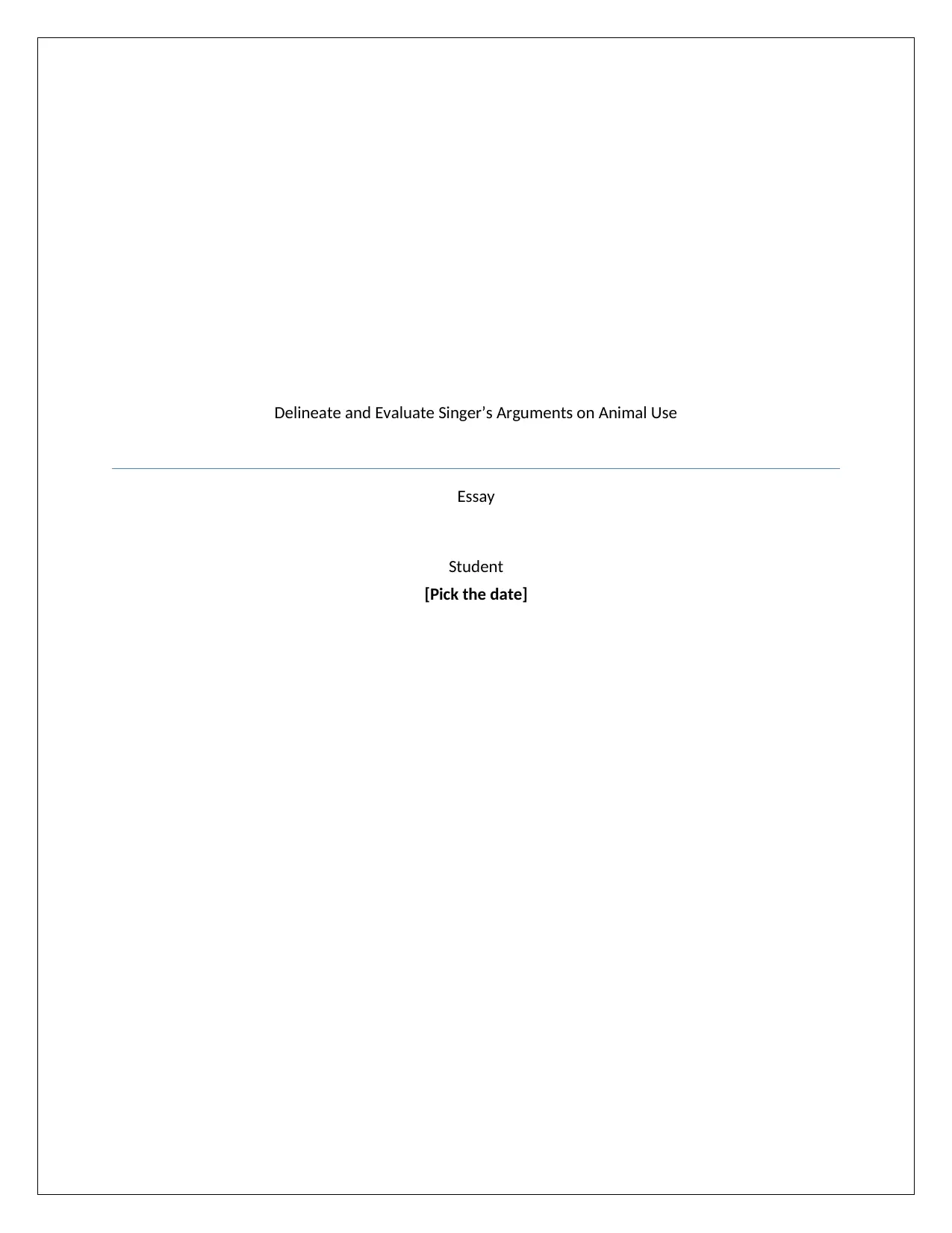
Delineate and Evaluate Singer’s Arguments on Animal Use
Essay
Student
[Pick the date]
Essay
Student
[Pick the date]
Secure Best Marks with AI Grader
Need help grading? Try our AI Grader for instant feedback on your assignments.
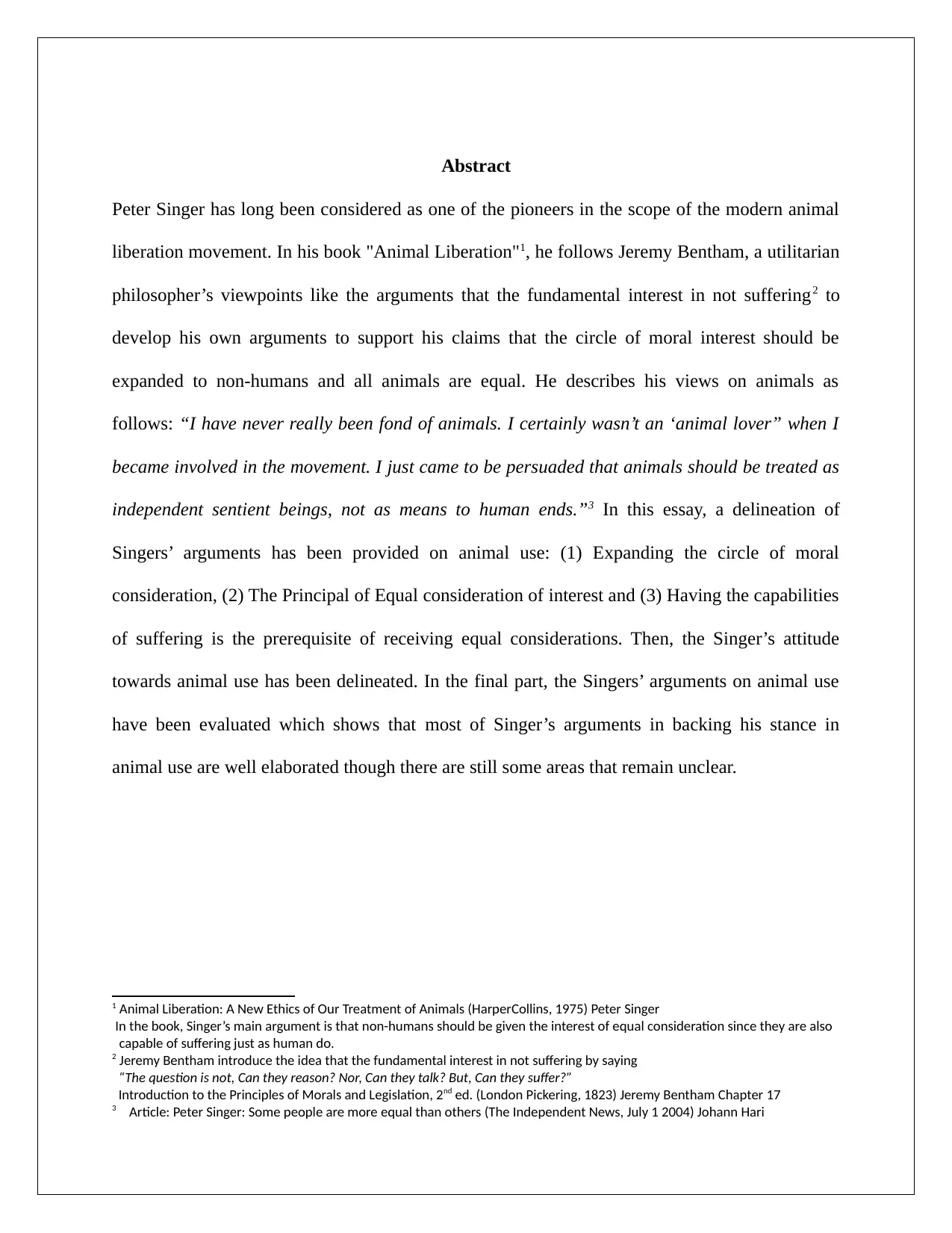
Abstract
Peter Singer has long been considered as one of the pioneers in the scope of the modern animal
liberation movement. In his book "Animal Liberation"1, he follows Jeremy Bentham, a utilitarian
philosopher’s viewpoints like the arguments that the fundamental interest in not suffering2 to
develop his own arguments to support his claims that the circle of moral interest should be
expanded to non-humans and all animals are equal. He describes his views on animals as
follows: “I have never really been fond of animals. I certainly wasn’t an ‘animal lover” when I
became involved in the movement. I just came to be persuaded that animals should be treated as
independent sentient beings, not as means to human ends.”3 In this essay, a delineation of
Singers’ arguments has been provided on animal use: (1) Expanding the circle of moral
consideration, (2) The Principal of Equal consideration of interest and (3) Having the capabilities
of suffering is the prerequisite of receiving equal considerations. Then, the Singer’s attitude
towards animal use has been delineated. In the final part, the Singers’ arguments on animal use
have been evaluated which shows that most of Singer’s arguments in backing his stance in
animal use are well elaborated though there are still some areas that remain unclear.
1 Animal Liberation: A New Ethics of Our Treatment of Animals (HarperCollins, 1975) Peter Singer
In the book, Singer’s main argument is that non-humans should be given the interest of equal consideration since they are also
capable of suffering just as human do.
2 Jeremy Bentham introduce the idea that the fundamental interest in not suffering by saying
“The question is not, Can they reason? Nor, Can they talk? But, Can they suffer?”
Introduction to the Principles of Morals and Legislation, 2nd ed. (London Pickering, 1823) Jeremy Bentham Chapter 17
3 Article: Peter Singer: Some people are more equal than others (The Independent News, July 1 2004) Johann Hari
Peter Singer has long been considered as one of the pioneers in the scope of the modern animal
liberation movement. In his book "Animal Liberation"1, he follows Jeremy Bentham, a utilitarian
philosopher’s viewpoints like the arguments that the fundamental interest in not suffering2 to
develop his own arguments to support his claims that the circle of moral interest should be
expanded to non-humans and all animals are equal. He describes his views on animals as
follows: “I have never really been fond of animals. I certainly wasn’t an ‘animal lover” when I
became involved in the movement. I just came to be persuaded that animals should be treated as
independent sentient beings, not as means to human ends.”3 In this essay, a delineation of
Singers’ arguments has been provided on animal use: (1) Expanding the circle of moral
consideration, (2) The Principal of Equal consideration of interest and (3) Having the capabilities
of suffering is the prerequisite of receiving equal considerations. Then, the Singer’s attitude
towards animal use has been delineated. In the final part, the Singers’ arguments on animal use
have been evaluated which shows that most of Singer’s arguments in backing his stance in
animal use are well elaborated though there are still some areas that remain unclear.
1 Animal Liberation: A New Ethics of Our Treatment of Animals (HarperCollins, 1975) Peter Singer
In the book, Singer’s main argument is that non-humans should be given the interest of equal consideration since they are also
capable of suffering just as human do.
2 Jeremy Bentham introduce the idea that the fundamental interest in not suffering by saying
“The question is not, Can they reason? Nor, Can they talk? But, Can they suffer?”
Introduction to the Principles of Morals and Legislation, 2nd ed. (London Pickering, 1823) Jeremy Bentham Chapter 17
3 Article: Peter Singer: Some people are more equal than others (The Independent News, July 1 2004) Johann Hari
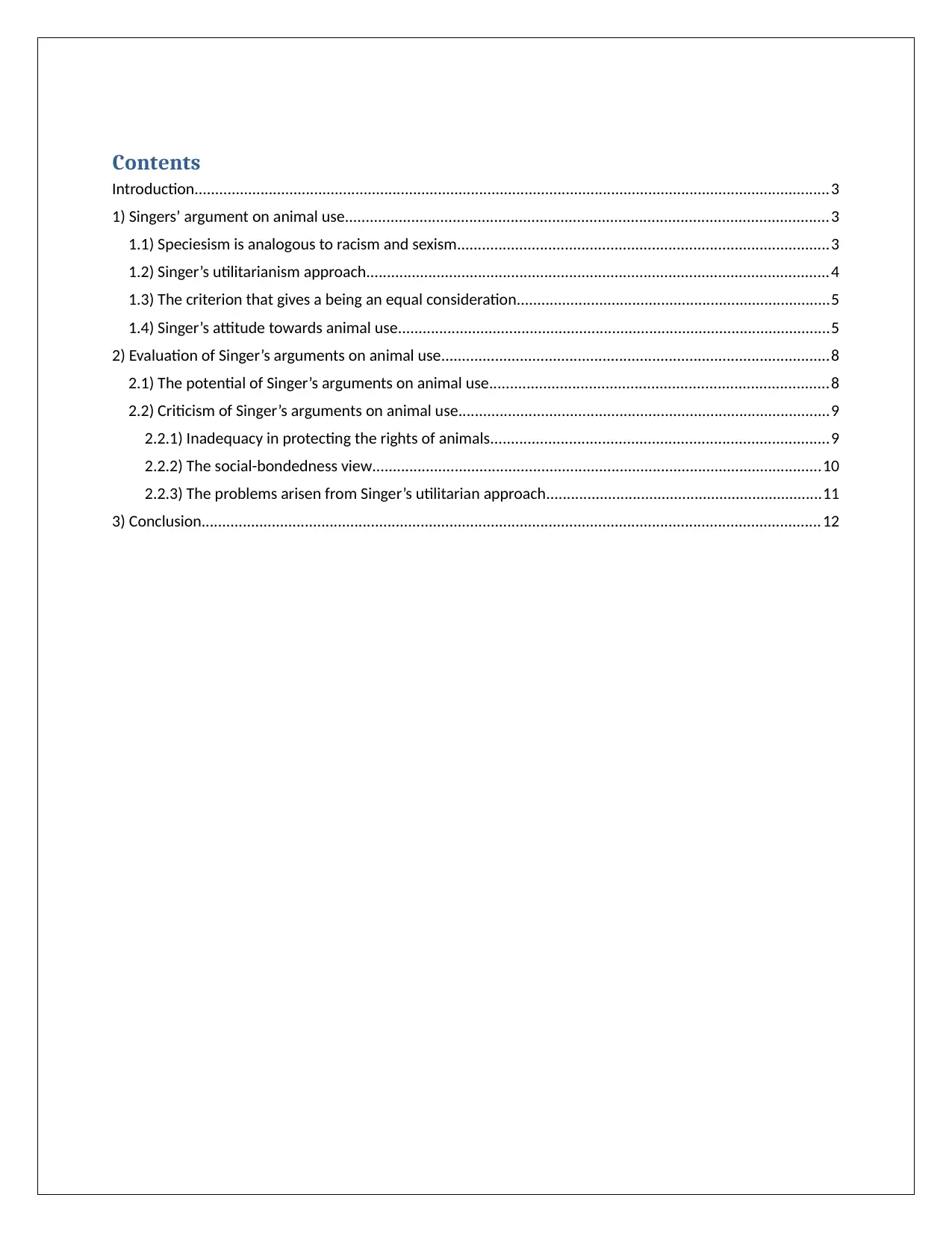
Contents
Introduction..........................................................................................................................................................3
1) Singers’ argument on animal use.....................................................................................................................3
1.1) Speciesism is analogous to racism and sexism..........................................................................................3
1.2) Singer’s utilitarianism approach................................................................................................................4
1.3) The criterion that gives a being an equal consideration............................................................................5
1.4) Singer’s attitude towards animal use.........................................................................................................5
2) Evaluation of Singer’s arguments on animal use..............................................................................................8
2.1) The potential of Singer’s arguments on animal use..................................................................................8
2.2) Criticism of Singer’s arguments on animal use..........................................................................................9
2.2.1) Inadequacy in protecting the rights of animals..................................................................................9
2.2.2) The social-bondedness view.............................................................................................................10
2.2.3) The problems arisen from Singer’s utilitarian approach...................................................................11
3) Conclusion......................................................................................................................................................12
Introduction..........................................................................................................................................................3
1) Singers’ argument on animal use.....................................................................................................................3
1.1) Speciesism is analogous to racism and sexism..........................................................................................3
1.2) Singer’s utilitarianism approach................................................................................................................4
1.3) The criterion that gives a being an equal consideration............................................................................5
1.4) Singer’s attitude towards animal use.........................................................................................................5
2) Evaluation of Singer’s arguments on animal use..............................................................................................8
2.1) The potential of Singer’s arguments on animal use..................................................................................8
2.2) Criticism of Singer’s arguments on animal use..........................................................................................9
2.2.1) Inadequacy in protecting the rights of animals..................................................................................9
2.2.2) The social-bondedness view.............................................................................................................10
2.2.3) The problems arisen from Singer’s utilitarian approach...................................................................11
3) Conclusion......................................................................................................................................................12
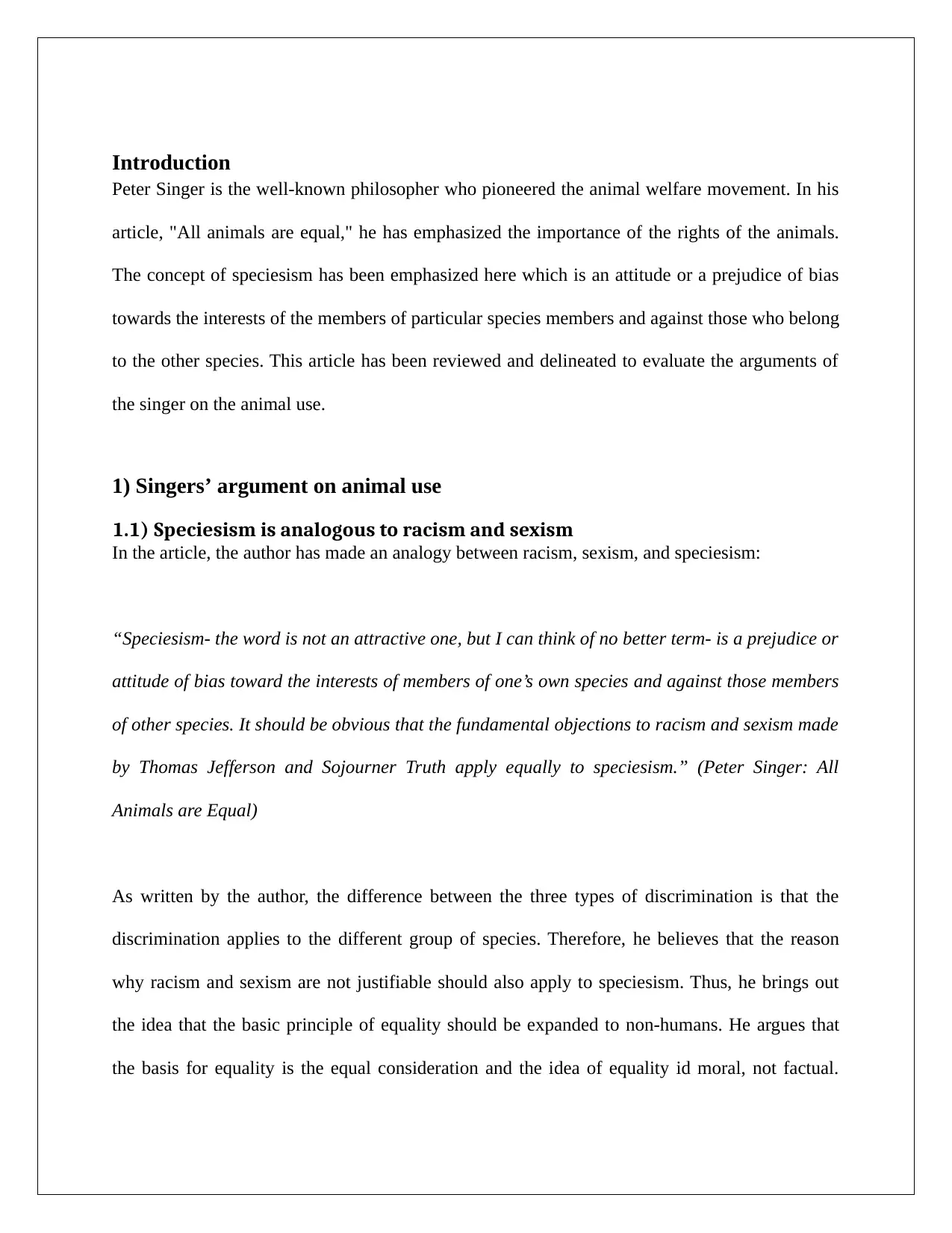
Introduction
Peter Singer is the well-known philosopher who pioneered the animal welfare movement. In his
article, "All animals are equal," he has emphasized the importance of the rights of the animals.
The concept of speciesism has been emphasized here which is an attitude or a prejudice of bias
towards the interests of the members of particular species members and against those who belong
to the other species. This article has been reviewed and delineated to evaluate the arguments of
the singer on the animal use.
1) Singers’ argument on animal use
1.1) Speciesism is analogous to racism and sexism
In the article, the author has made an analogy between racism, sexism, and speciesism:
“Speciesism- the word is not an attractive one, but I can think of no better term- is a prejudice or
attitude of bias toward the interests of members of one’s own species and against those members
of other species. It should be obvious that the fundamental objections to racism and sexism made
by Thomas Jefferson and Sojourner Truth apply equally to speciesism.” (Peter Singer: All
Animals are Equal)
As written by the author, the difference between the three types of discrimination is that the
discrimination applies to the different group of species. Therefore, he believes that the reason
why racism and sexism are not justifiable should also apply to speciesism. Thus, he brings out
the idea that the basic principle of equality should be expanded to non-humans. He argues that
the basis for equality is the equal consideration and the idea of equality id moral, not factual.
Peter Singer is the well-known philosopher who pioneered the animal welfare movement. In his
article, "All animals are equal," he has emphasized the importance of the rights of the animals.
The concept of speciesism has been emphasized here which is an attitude or a prejudice of bias
towards the interests of the members of particular species members and against those who belong
to the other species. This article has been reviewed and delineated to evaluate the arguments of
the singer on the animal use.
1) Singers’ argument on animal use
1.1) Speciesism is analogous to racism and sexism
In the article, the author has made an analogy between racism, sexism, and speciesism:
“Speciesism- the word is not an attractive one, but I can think of no better term- is a prejudice or
attitude of bias toward the interests of members of one’s own species and against those members
of other species. It should be obvious that the fundamental objections to racism and sexism made
by Thomas Jefferson and Sojourner Truth apply equally to speciesism.” (Peter Singer: All
Animals are Equal)
As written by the author, the difference between the three types of discrimination is that the
discrimination applies to the different group of species. Therefore, he believes that the reason
why racism and sexism are not justifiable should also apply to speciesism. Thus, he brings out
the idea that the basic principle of equality should be expanded to non-humans. He argues that
the basis for equality is the equal consideration and the idea of equality id moral, not factual.
Secure Best Marks with AI Grader
Need help grading? Try our AI Grader for instant feedback on your assignments.
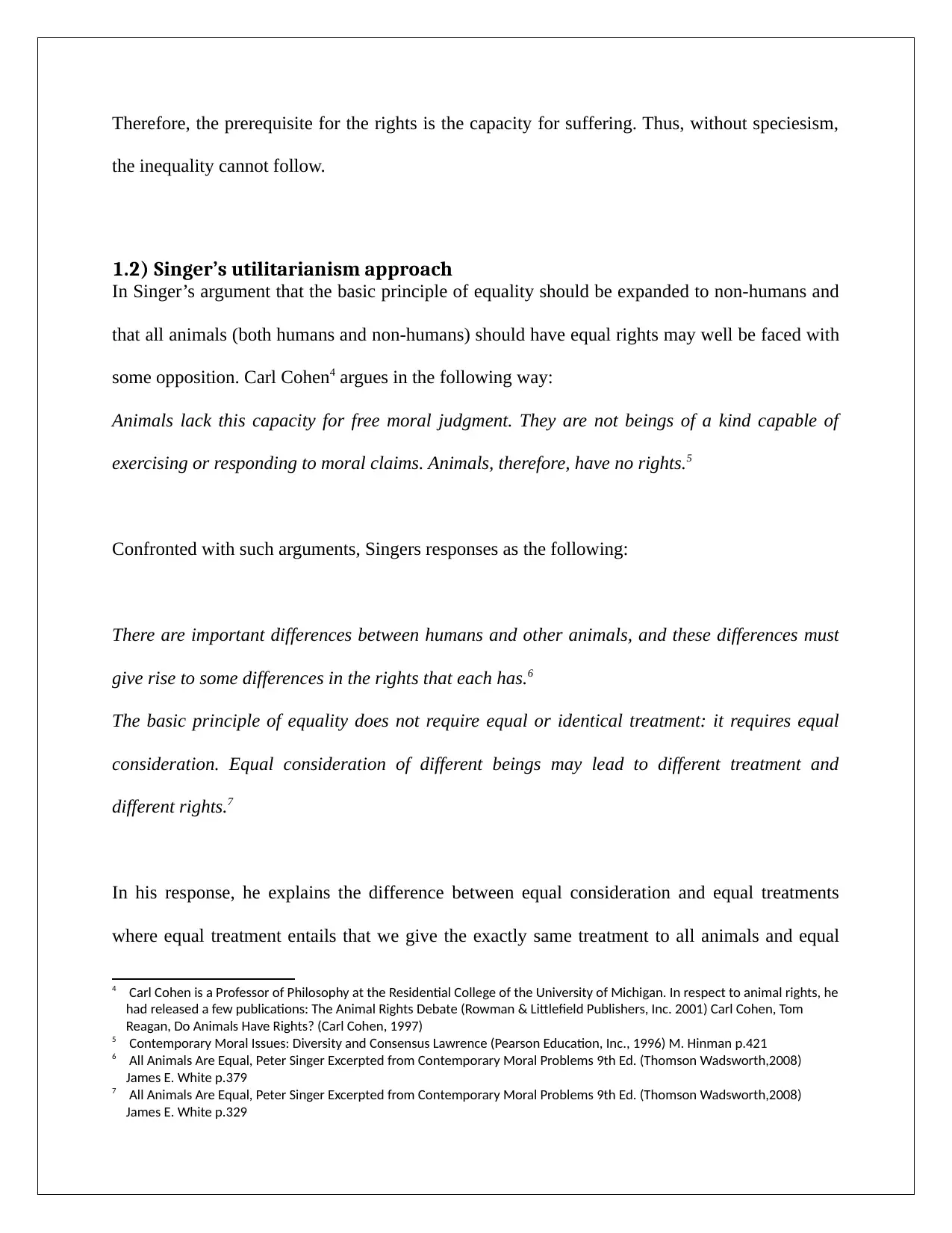
Therefore, the prerequisite for the rights is the capacity for suffering. Thus, without speciesism,
the inequality cannot follow.
1.2) Singer’s utilitarianism approach
In Singer’s argument that the basic principle of equality should be expanded to non-humans and
that all animals (both humans and non-humans) should have equal rights may well be faced with
some opposition. Carl Cohen4 argues in the following way:
Animals lack this capacity for free moral judgment. They are not beings of a kind capable of
exercising or responding to moral claims. Animals, therefore, have no rights.5
Confronted with such arguments, Singers responses as the following:
There are important differences between humans and other animals, and these differences must
give rise to some differences in the rights that each has.6
The basic principle of equality does not require equal or identical treatment: it requires equal
consideration. Equal consideration of different beings may lead to different treatment and
different rights.7
In his response, he explains the difference between equal consideration and equal treatments
where equal treatment entails that we give the exactly same treatment to all animals and equal
4 Carl Cohen is a Professor of Philosophy at the Residential College of the University of Michigan. In respect to animal rights, he
had released a few publications: The Animal Rights Debate (Rowman & Littlefield Publishers, Inc. 2001) Carl Cohen, Tom
Reagan, Do Animals Have Rights? (Carl Cohen, 1997)
5 Contemporary Moral Issues: Diversity and Consensus Lawrence (Pearson Education, Inc., 1996) M. Hinman p.421
6 All Animals Are Equal, Peter Singer Excerpted from Contemporary Moral Problems 9th Ed. (Thomson Wadsworth,2008)
James E. White p.379
7 All Animals Are Equal, Peter Singer Excerpted from Contemporary Moral Problems 9th Ed. (Thomson Wadsworth,2008)
James E. White p.329
the inequality cannot follow.
1.2) Singer’s utilitarianism approach
In Singer’s argument that the basic principle of equality should be expanded to non-humans and
that all animals (both humans and non-humans) should have equal rights may well be faced with
some opposition. Carl Cohen4 argues in the following way:
Animals lack this capacity for free moral judgment. They are not beings of a kind capable of
exercising or responding to moral claims. Animals, therefore, have no rights.5
Confronted with such arguments, Singers responses as the following:
There are important differences between humans and other animals, and these differences must
give rise to some differences in the rights that each has.6
The basic principle of equality does not require equal or identical treatment: it requires equal
consideration. Equal consideration of different beings may lead to different treatment and
different rights.7
In his response, he explains the difference between equal consideration and equal treatments
where equal treatment entails that we give the exactly same treatment to all animals and equal
4 Carl Cohen is a Professor of Philosophy at the Residential College of the University of Michigan. In respect to animal rights, he
had released a few publications: The Animal Rights Debate (Rowman & Littlefield Publishers, Inc. 2001) Carl Cohen, Tom
Reagan, Do Animals Have Rights? (Carl Cohen, 1997)
5 Contemporary Moral Issues: Diversity and Consensus Lawrence (Pearson Education, Inc., 1996) M. Hinman p.421
6 All Animals Are Equal, Peter Singer Excerpted from Contemporary Moral Problems 9th Ed. (Thomson Wadsworth,2008)
James E. White p.379
7 All Animals Are Equal, Peter Singer Excerpted from Contemporary Moral Problems 9th Ed. (Thomson Wadsworth,2008)
James E. White p.329
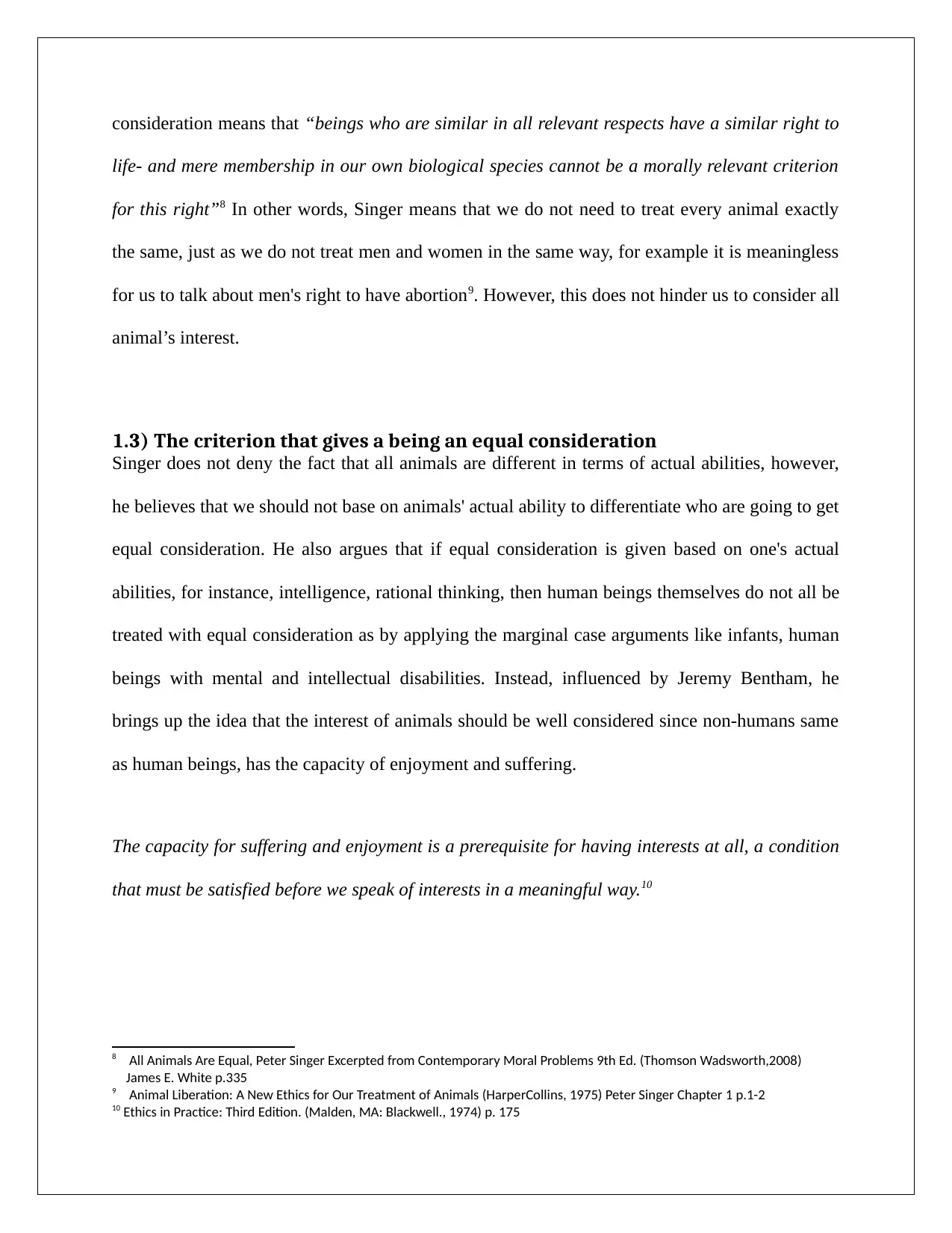
consideration means that “beings who are similar in all relevant respects have a similar right to
life- and mere membership in our own biological species cannot be a morally relevant criterion
for this right”8 In other words, Singer means that we do not need to treat every animal exactly
the same, just as we do not treat men and women in the same way, for example it is meaningless
for us to talk about men's right to have abortion9. However, this does not hinder us to consider all
animal’s interest.
1.3) The criterion that gives a being an equal consideration
Singer does not deny the fact that all animals are different in terms of actual abilities, however,
he believes that we should not base on animals' actual ability to differentiate who are going to get
equal consideration. He also argues that if equal consideration is given based on one's actual
abilities, for instance, intelligence, rational thinking, then human beings themselves do not all be
treated with equal consideration as by applying the marginal case arguments like infants, human
beings with mental and intellectual disabilities. Instead, influenced by Jeremy Bentham, he
brings up the idea that the interest of animals should be well considered since non-humans same
as human beings, has the capacity of enjoyment and suffering.
The capacity for suffering and enjoyment is a prerequisite for having interests at all, a condition
that must be satisfied before we speak of interests in a meaningful way.10
8 All Animals Are Equal, Peter Singer Excerpted from Contemporary Moral Problems 9th Ed. (Thomson Wadsworth,2008)
James E. White p.335
9 Animal Liberation: A New Ethics for Our Treatment of Animals (HarperCollins, 1975) Peter Singer Chapter 1 p.1-2
10 Ethics in Practice: Third Edition. (Malden, MA: Blackwell., 1974) p. 175
life- and mere membership in our own biological species cannot be a morally relevant criterion
for this right”8 In other words, Singer means that we do not need to treat every animal exactly
the same, just as we do not treat men and women in the same way, for example it is meaningless
for us to talk about men's right to have abortion9. However, this does not hinder us to consider all
animal’s interest.
1.3) The criterion that gives a being an equal consideration
Singer does not deny the fact that all animals are different in terms of actual abilities, however,
he believes that we should not base on animals' actual ability to differentiate who are going to get
equal consideration. He also argues that if equal consideration is given based on one's actual
abilities, for instance, intelligence, rational thinking, then human beings themselves do not all be
treated with equal consideration as by applying the marginal case arguments like infants, human
beings with mental and intellectual disabilities. Instead, influenced by Jeremy Bentham, he
brings up the idea that the interest of animals should be well considered since non-humans same
as human beings, has the capacity of enjoyment and suffering.
The capacity for suffering and enjoyment is a prerequisite for having interests at all, a condition
that must be satisfied before we speak of interests in a meaningful way.10
8 All Animals Are Equal, Peter Singer Excerpted from Contemporary Moral Problems 9th Ed. (Thomson Wadsworth,2008)
James E. White p.335
9 Animal Liberation: A New Ethics for Our Treatment of Animals (HarperCollins, 1975) Peter Singer Chapter 1 p.1-2
10 Ethics in Practice: Third Edition. (Malden, MA: Blackwell., 1974) p. 175
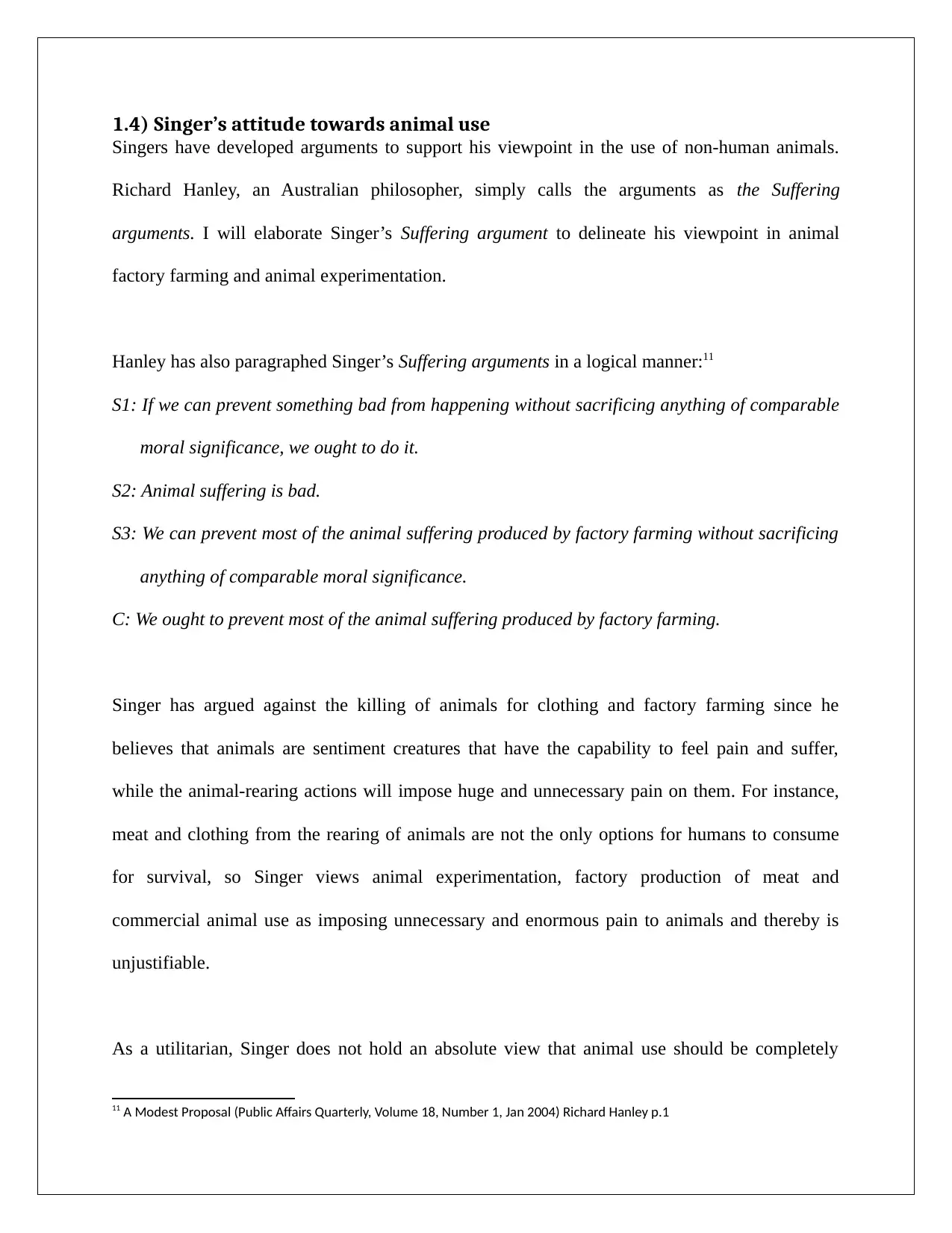
1.4) Singer’s attitude towards animal use
Singers have developed arguments to support his viewpoint in the use of non-human animals.
Richard Hanley, an Australian philosopher, simply calls the arguments as the Suffering
arguments. I will elaborate Singer’s Suffering argument to delineate his viewpoint in animal
factory farming and animal experimentation.
Hanley has also paragraphed Singer’s Suffering arguments in a logical manner:11
S1: If we can prevent something bad from happening without sacrificing anything of comparable
moral significance, we ought to do it.
S2: Animal suffering is bad.
S3: We can prevent most of the animal suffering produced by factory farming without sacrificing
anything of comparable moral significance.
C: We ought to prevent most of the animal suffering produced by factory farming.
Singer has argued against the killing of animals for clothing and factory farming since he
believes that animals are sentiment creatures that have the capability to feel pain and suffer,
while the animal-rearing actions will impose huge and unnecessary pain on them. For instance,
meat and clothing from the rearing of animals are not the only options for humans to consume
for survival, so Singer views animal experimentation, factory production of meat and
commercial animal use as imposing unnecessary and enormous pain to animals and thereby is
unjustifiable.
As a utilitarian, Singer does not hold an absolute view that animal use should be completely
11 A Modest Proposal (Public Affairs Quarterly, Volume 18, Number 1, Jan 2004) Richard Hanley p.1
Singers have developed arguments to support his viewpoint in the use of non-human animals.
Richard Hanley, an Australian philosopher, simply calls the arguments as the Suffering
arguments. I will elaborate Singer’s Suffering argument to delineate his viewpoint in animal
factory farming and animal experimentation.
Hanley has also paragraphed Singer’s Suffering arguments in a logical manner:11
S1: If we can prevent something bad from happening without sacrificing anything of comparable
moral significance, we ought to do it.
S2: Animal suffering is bad.
S3: We can prevent most of the animal suffering produced by factory farming without sacrificing
anything of comparable moral significance.
C: We ought to prevent most of the animal suffering produced by factory farming.
Singer has argued against the killing of animals for clothing and factory farming since he
believes that animals are sentiment creatures that have the capability to feel pain and suffer,
while the animal-rearing actions will impose huge and unnecessary pain on them. For instance,
meat and clothing from the rearing of animals are not the only options for humans to consume
for survival, so Singer views animal experimentation, factory production of meat and
commercial animal use as imposing unnecessary and enormous pain to animals and thereby is
unjustifiable.
As a utilitarian, Singer does not hold an absolute view that animal use should be completely
11 A Modest Proposal (Public Affairs Quarterly, Volume 18, Number 1, Jan 2004) Richard Hanley p.1
Paraphrase This Document
Need a fresh take? Get an instant paraphrase of this document with our AI Paraphraser
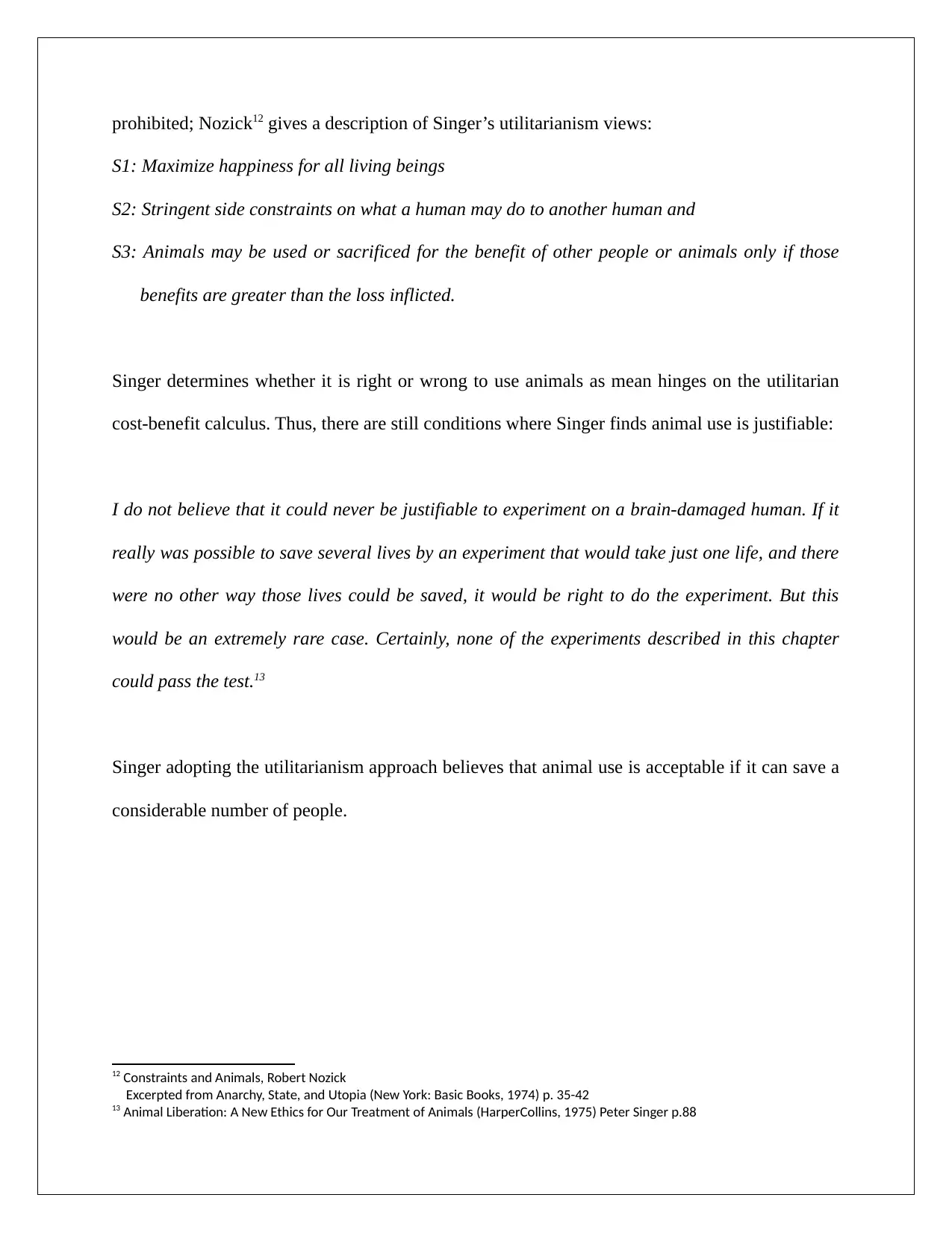
prohibited; Nozick12 gives a description of Singer’s utilitarianism views:
S1: Maximize happiness for all living beings
S2: Stringent side constraints on what a human may do to another human and
S3: Animals may be used or sacrificed for the benefit of other people or animals only if those
benefits are greater than the loss inflicted.
Singer determines whether it is right or wrong to use animals as mean hinges on the utilitarian
cost-benefit calculus. Thus, there are still conditions where Singer finds animal use is justifiable:
I do not believe that it could never be justifiable to experiment on a brain-damaged human. If it
really was possible to save several lives by an experiment that would take just one life, and there
were no other way those lives could be saved, it would be right to do the experiment. But this
would be an extremely rare case. Certainly, none of the experiments described in this chapter
could pass the test.13
Singer adopting the utilitarianism approach believes that animal use is acceptable if it can save a
considerable number of people.
12 Constraints and Animals, Robert Nozick
Excerpted from Anarchy, State, and Utopia (New York: Basic Books, 1974) p. 35-42
13 Animal Liberation: A New Ethics for Our Treatment of Animals (HarperCollins, 1975) Peter Singer p.88
S1: Maximize happiness for all living beings
S2: Stringent side constraints on what a human may do to another human and
S3: Animals may be used or sacrificed for the benefit of other people or animals only if those
benefits are greater than the loss inflicted.
Singer determines whether it is right or wrong to use animals as mean hinges on the utilitarian
cost-benefit calculus. Thus, there are still conditions where Singer finds animal use is justifiable:
I do not believe that it could never be justifiable to experiment on a brain-damaged human. If it
really was possible to save several lives by an experiment that would take just one life, and there
were no other way those lives could be saved, it would be right to do the experiment. But this
would be an extremely rare case. Certainly, none of the experiments described in this chapter
could pass the test.13
Singer adopting the utilitarianism approach believes that animal use is acceptable if it can save a
considerable number of people.
12 Constraints and Animals, Robert Nozick
Excerpted from Anarchy, State, and Utopia (New York: Basic Books, 1974) p. 35-42
13 Animal Liberation: A New Ethics for Our Treatment of Animals (HarperCollins, 1975) Peter Singer p.88
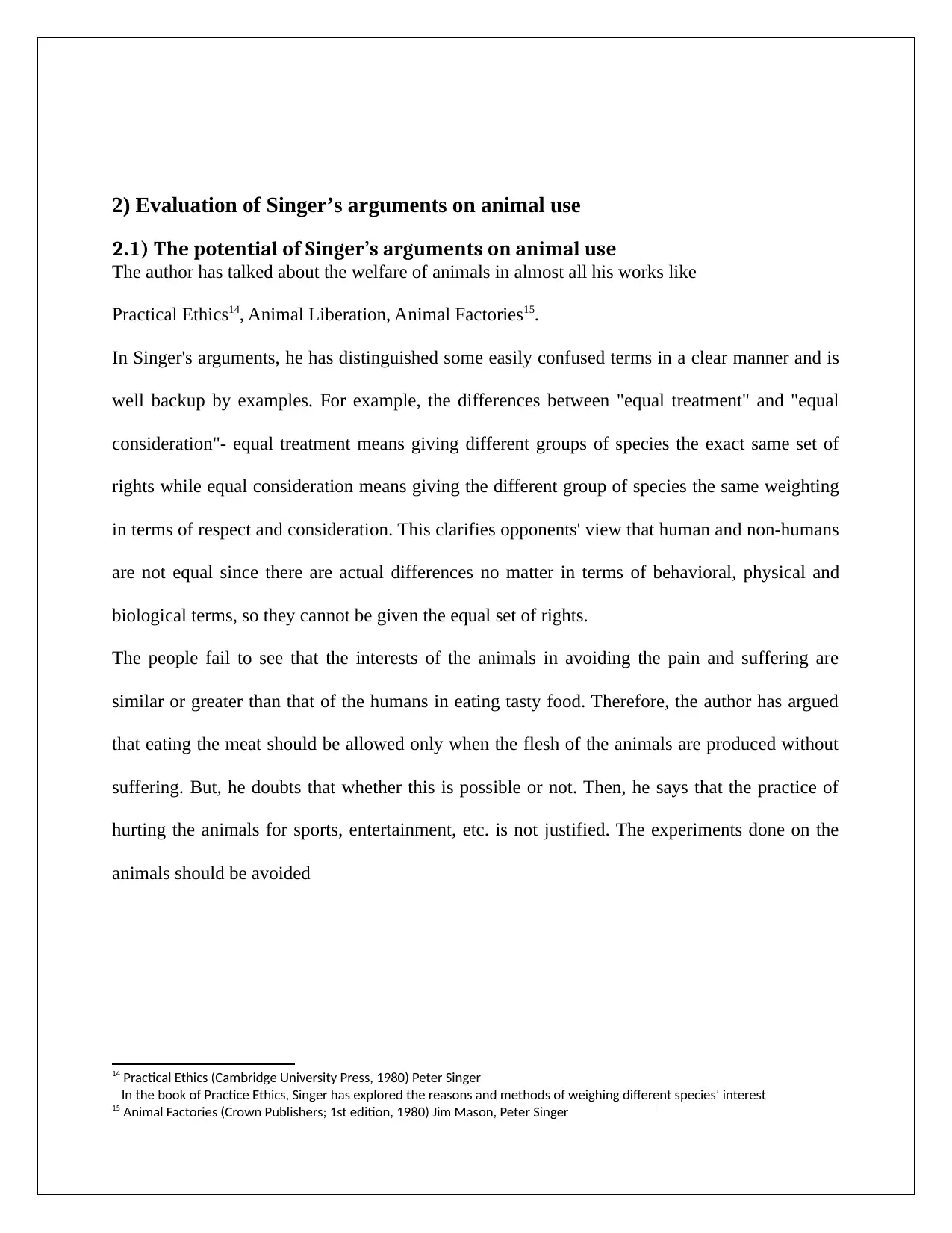
2) Evaluation of Singer’s arguments on animal use
2.1) The potential of Singer’s arguments on animal use
The author has talked about the welfare of animals in almost all his works like
Practical Ethics14, Animal Liberation, Animal Factories15.
In Singer's arguments, he has distinguished some easily confused terms in a clear manner and is
well backup by examples. For example, the differences between "equal treatment" and "equal
consideration"- equal treatment means giving different groups of species the exact same set of
rights while equal consideration means giving the different group of species the same weighting
in terms of respect and consideration. This clarifies opponents' view that human and non-humans
are not equal since there are actual differences no matter in terms of behavioral, physical and
biological terms, so they cannot be given the equal set of rights.
The people fail to see that the interests of the animals in avoiding the pain and suffering are
similar or greater than that of the humans in eating tasty food. Therefore, the author has argued
that eating the meat should be allowed only when the flesh of the animals are produced without
suffering. But, he doubts that whether this is possible or not. Then, he says that the practice of
hurting the animals for sports, entertainment, etc. is not justified. The experiments done on the
animals should be avoided
14 Practical Ethics (Cambridge University Press, 1980) Peter Singer
In the book of Practice Ethics, Singer has explored the reasons and methods of weighing different species’ interest
15 Animal Factories (Crown Publishers; 1st edition, 1980) Jim Mason, Peter Singer
2.1) The potential of Singer’s arguments on animal use
The author has talked about the welfare of animals in almost all his works like
Practical Ethics14, Animal Liberation, Animal Factories15.
In Singer's arguments, he has distinguished some easily confused terms in a clear manner and is
well backup by examples. For example, the differences between "equal treatment" and "equal
consideration"- equal treatment means giving different groups of species the exact same set of
rights while equal consideration means giving the different group of species the same weighting
in terms of respect and consideration. This clarifies opponents' view that human and non-humans
are not equal since there are actual differences no matter in terms of behavioral, physical and
biological terms, so they cannot be given the equal set of rights.
The people fail to see that the interests of the animals in avoiding the pain and suffering are
similar or greater than that of the humans in eating tasty food. Therefore, the author has argued
that eating the meat should be allowed only when the flesh of the animals are produced without
suffering. But, he doubts that whether this is possible or not. Then, he says that the practice of
hurting the animals for sports, entertainment, etc. is not justified. The experiments done on the
animals should be avoided
14 Practical Ethics (Cambridge University Press, 1980) Peter Singer
In the book of Practice Ethics, Singer has explored the reasons and methods of weighing different species’ interest
15 Animal Factories (Crown Publishers; 1st edition, 1980) Jim Mason, Peter Singer
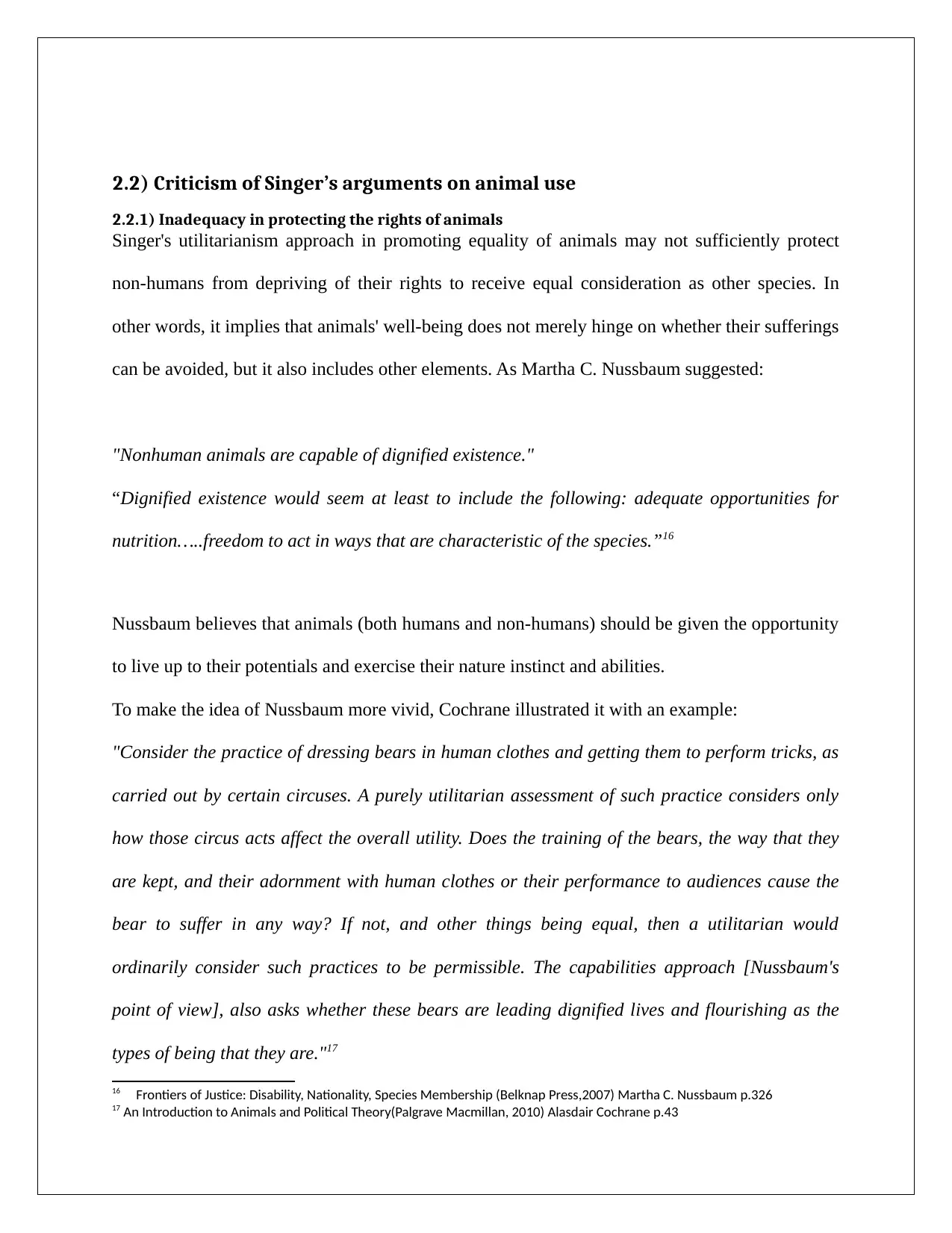
2.2) Criticism of Singer’s arguments on animal use
2.2.1) Inadequacy in protecting the rights of animals
Singer's utilitarianism approach in promoting equality of animals may not sufficiently protect
non-humans from depriving of their rights to receive equal consideration as other species. In
other words, it implies that animals' well-being does not merely hinge on whether their sufferings
can be avoided, but it also includes other elements. As Martha C. Nussbaum suggested:
"Nonhuman animals are capable of dignified existence."
“Dignified existence would seem at least to include the following: adequate opportunities for
nutrition…..freedom to act in ways that are characteristic of the species.”16
Nussbaum believes that animals (both humans and non-humans) should be given the opportunity
to live up to their potentials and exercise their nature instinct and abilities.
To make the idea of Nussbaum more vivid, Cochrane illustrated it with an example:
"Consider the practice of dressing bears in human clothes and getting them to perform tricks, as
carried out by certain circuses. A purely utilitarian assessment of such practice considers only
how those circus acts affect the overall utility. Does the training of the bears, the way that they
are kept, and their adornment with human clothes or their performance to audiences cause the
bear to suffer in any way? If not, and other things being equal, then a utilitarian would
ordinarily consider such practices to be permissible. The capabilities approach [Nussbaum's
point of view], also asks whether these bears are leading dignified lives and flourishing as the
types of being that they are."17
16 Frontiers of Justice: Disability, Nationality, Species Membership (Belknap Press,2007) Martha C. Nussbaum p.326
17 An Introduction to Animals and Political Theory(Palgrave Macmillan, 2010) Alasdair Cochrane p.43
2.2.1) Inadequacy in protecting the rights of animals
Singer's utilitarianism approach in promoting equality of animals may not sufficiently protect
non-humans from depriving of their rights to receive equal consideration as other species. In
other words, it implies that animals' well-being does not merely hinge on whether their sufferings
can be avoided, but it also includes other elements. As Martha C. Nussbaum suggested:
"Nonhuman animals are capable of dignified existence."
“Dignified existence would seem at least to include the following: adequate opportunities for
nutrition…..freedom to act in ways that are characteristic of the species.”16
Nussbaum believes that animals (both humans and non-humans) should be given the opportunity
to live up to their potentials and exercise their nature instinct and abilities.
To make the idea of Nussbaum more vivid, Cochrane illustrated it with an example:
"Consider the practice of dressing bears in human clothes and getting them to perform tricks, as
carried out by certain circuses. A purely utilitarian assessment of such practice considers only
how those circus acts affect the overall utility. Does the training of the bears, the way that they
are kept, and their adornment with human clothes or their performance to audiences cause the
bear to suffer in any way? If not, and other things being equal, then a utilitarian would
ordinarily consider such practices to be permissible. The capabilities approach [Nussbaum's
point of view], also asks whether these bears are leading dignified lives and flourishing as the
types of being that they are."17
16 Frontiers of Justice: Disability, Nationality, Species Membership (Belknap Press,2007) Martha C. Nussbaum p.326
17 An Introduction to Animals and Political Theory(Palgrave Macmillan, 2010) Alasdair Cochrane p.43
Secure Best Marks with AI Grader
Need help grading? Try our AI Grader for instant feedback on your assignments.
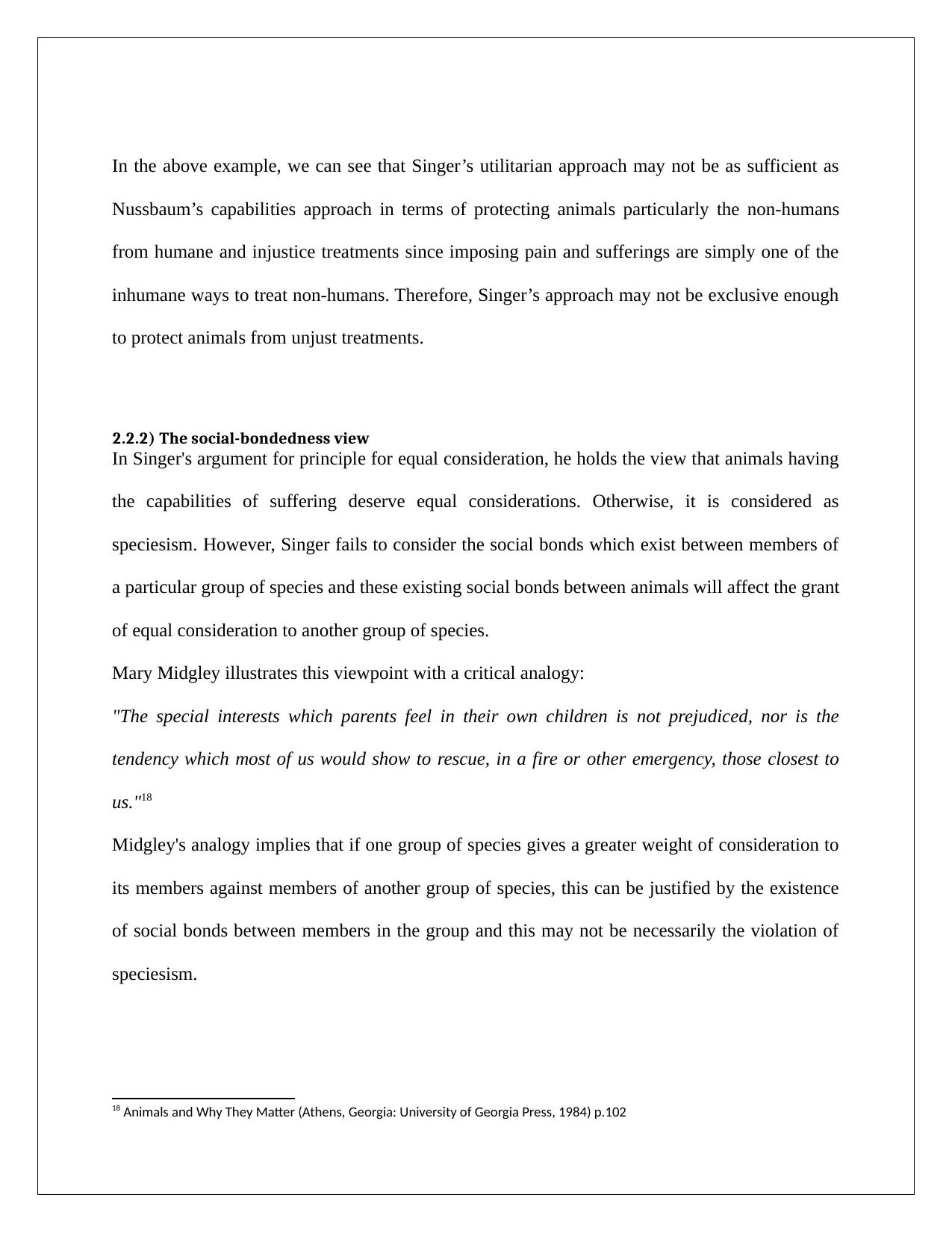
In the above example, we can see that Singer’s utilitarian approach may not be as sufficient as
Nussbaum’s capabilities approach in terms of protecting animals particularly the non-humans
from humane and injustice treatments since imposing pain and sufferings are simply one of the
inhumane ways to treat non-humans. Therefore, Singer’s approach may not be exclusive enough
to protect animals from unjust treatments.
2.2.2) The social-bondedness view
In Singer's argument for principle for equal consideration, he holds the view that animals having
the capabilities of suffering deserve equal considerations. Otherwise, it is considered as
speciesism. However, Singer fails to consider the social bonds which exist between members of
a particular group of species and these existing social bonds between animals will affect the grant
of equal consideration to another group of species.
Mary Midgley illustrates this viewpoint with a critical analogy:
"The special interests which parents feel in their own children is not prejudiced, nor is the
tendency which most of us would show to rescue, in a fire or other emergency, those closest to
us."18
Midgley's analogy implies that if one group of species gives a greater weight of consideration to
its members against members of another group of species, this can be justified by the existence
of social bonds between members in the group and this may not be necessarily the violation of
speciesism.
18 Animals and Why They Matter (Athens, Georgia: University of Georgia Press, 1984) p.102
Nussbaum’s capabilities approach in terms of protecting animals particularly the non-humans
from humane and injustice treatments since imposing pain and sufferings are simply one of the
inhumane ways to treat non-humans. Therefore, Singer’s approach may not be exclusive enough
to protect animals from unjust treatments.
2.2.2) The social-bondedness view
In Singer's argument for principle for equal consideration, he holds the view that animals having
the capabilities of suffering deserve equal considerations. Otherwise, it is considered as
speciesism. However, Singer fails to consider the social bonds which exist between members of
a particular group of species and these existing social bonds between animals will affect the grant
of equal consideration to another group of species.
Mary Midgley illustrates this viewpoint with a critical analogy:
"The special interests which parents feel in their own children is not prejudiced, nor is the
tendency which most of us would show to rescue, in a fire or other emergency, those closest to
us."18
Midgley's analogy implies that if one group of species gives a greater weight of consideration to
its members against members of another group of species, this can be justified by the existence
of social bonds between members in the group and this may not be necessarily the violation of
speciesism.
18 Animals and Why They Matter (Athens, Georgia: University of Georgia Press, 1984) p.102
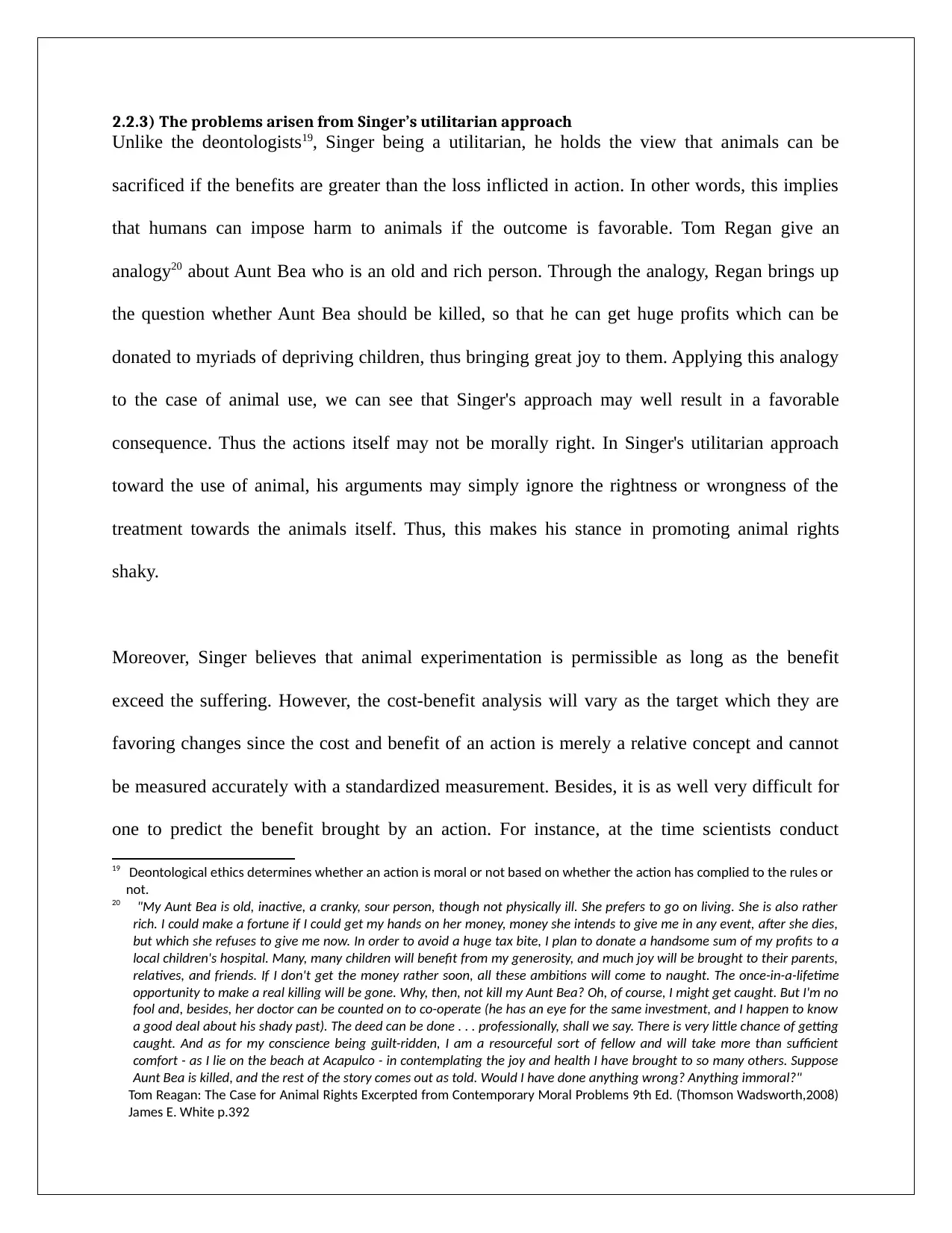
2.2.3) The problems arisen from Singer’s utilitarian approach
Unlike the deontologists19, Singer being a utilitarian, he holds the view that animals can be
sacrificed if the benefits are greater than the loss inflicted in action. In other words, this implies
that humans can impose harm to animals if the outcome is favorable. Tom Regan give an
analogy20 about Aunt Bea who is an old and rich person. Through the analogy, Regan brings up
the question whether Aunt Bea should be killed, so that he can get huge profits which can be
donated to myriads of depriving children, thus bringing great joy to them. Applying this analogy
to the case of animal use, we can see that Singer's approach may well result in a favorable
consequence. Thus the actions itself may not be morally right. In Singer's utilitarian approach
toward the use of animal, his arguments may simply ignore the rightness or wrongness of the
treatment towards the animals itself. Thus, this makes his stance in promoting animal rights
shaky.
Moreover, Singer believes that animal experimentation is permissible as long as the benefit
exceed the suffering. However, the cost-benefit analysis will vary as the target which they are
favoring changes since the cost and benefit of an action is merely a relative concept and cannot
be measured accurately with a standardized measurement. Besides, it is as well very difficult for
one to predict the benefit brought by an action. For instance, at the time scientists conduct
19 Deontological ethics determines whether an action is moral or not based on whether the action has complied to the rules or
not.
20 "My Aunt Bea is old, inactive, a cranky, sour person, though not physically ill. She prefers to go on living. She is also rather
rich. I could make a fortune if I could get my hands on her money, money she intends to give me in any event, after she dies,
but which she refuses to give me now. In order to avoid a huge tax bite, I plan to donate a handsome sum of my profits to a
local children's hospital. Many, many children will benefit from my generosity, and much joy will be brought to their parents,
relatives, and friends. If I don't get the money rather soon, all these ambitions will come to naught. The once-in-a-lifetime
opportunity to make a real killing will be gone. Why, then, not kill my Aunt Bea? Oh, of course, I might get caught. But I'm no
fool and, besides, her doctor can be counted on to co-operate (he has an eye for the same investment, and I happen to know
a good deal about his shady past). The deed can be done . . . professionally, shall we say. There is very little chance of getting
caught. And as for my conscience being guilt-ridden, I am a resourceful sort of fellow and will take more than sufficient
comfort - as I lie on the beach at Acapulco - in contemplating the joy and health I have brought to so many others. Suppose
Aunt Bea is killed, and the rest of the story comes out as told. Would I have done anything wrong? Anything immoral?"
Tom Reagan: The Case for Animal Rights Excerpted from Contemporary Moral Problems 9th Ed. (Thomson Wadsworth,2008)
James E. White p.392
Unlike the deontologists19, Singer being a utilitarian, he holds the view that animals can be
sacrificed if the benefits are greater than the loss inflicted in action. In other words, this implies
that humans can impose harm to animals if the outcome is favorable. Tom Regan give an
analogy20 about Aunt Bea who is an old and rich person. Through the analogy, Regan brings up
the question whether Aunt Bea should be killed, so that he can get huge profits which can be
donated to myriads of depriving children, thus bringing great joy to them. Applying this analogy
to the case of animal use, we can see that Singer's approach may well result in a favorable
consequence. Thus the actions itself may not be morally right. In Singer's utilitarian approach
toward the use of animal, his arguments may simply ignore the rightness or wrongness of the
treatment towards the animals itself. Thus, this makes his stance in promoting animal rights
shaky.
Moreover, Singer believes that animal experimentation is permissible as long as the benefit
exceed the suffering. However, the cost-benefit analysis will vary as the target which they are
favoring changes since the cost and benefit of an action is merely a relative concept and cannot
be measured accurately with a standardized measurement. Besides, it is as well very difficult for
one to predict the benefit brought by an action. For instance, at the time scientists conduct
19 Deontological ethics determines whether an action is moral or not based on whether the action has complied to the rules or
not.
20 "My Aunt Bea is old, inactive, a cranky, sour person, though not physically ill. She prefers to go on living. She is also rather
rich. I could make a fortune if I could get my hands on her money, money she intends to give me in any event, after she dies,
but which she refuses to give me now. In order to avoid a huge tax bite, I plan to donate a handsome sum of my profits to a
local children's hospital. Many, many children will benefit from my generosity, and much joy will be brought to their parents,
relatives, and friends. If I don't get the money rather soon, all these ambitions will come to naught. The once-in-a-lifetime
opportunity to make a real killing will be gone. Why, then, not kill my Aunt Bea? Oh, of course, I might get caught. But I'm no
fool and, besides, her doctor can be counted on to co-operate (he has an eye for the same investment, and I happen to know
a good deal about his shady past). The deed can be done . . . professionally, shall we say. There is very little chance of getting
caught. And as for my conscience being guilt-ridden, I am a resourceful sort of fellow and will take more than sufficient
comfort - as I lie on the beach at Acapulco - in contemplating the joy and health I have brought to so many others. Suppose
Aunt Bea is killed, and the rest of the story comes out as told. Would I have done anything wrong? Anything immoral?"
Tom Reagan: The Case for Animal Rights Excerpted from Contemporary Moral Problems 9th Ed. (Thomson Wadsworth,2008)
James E. White p.392
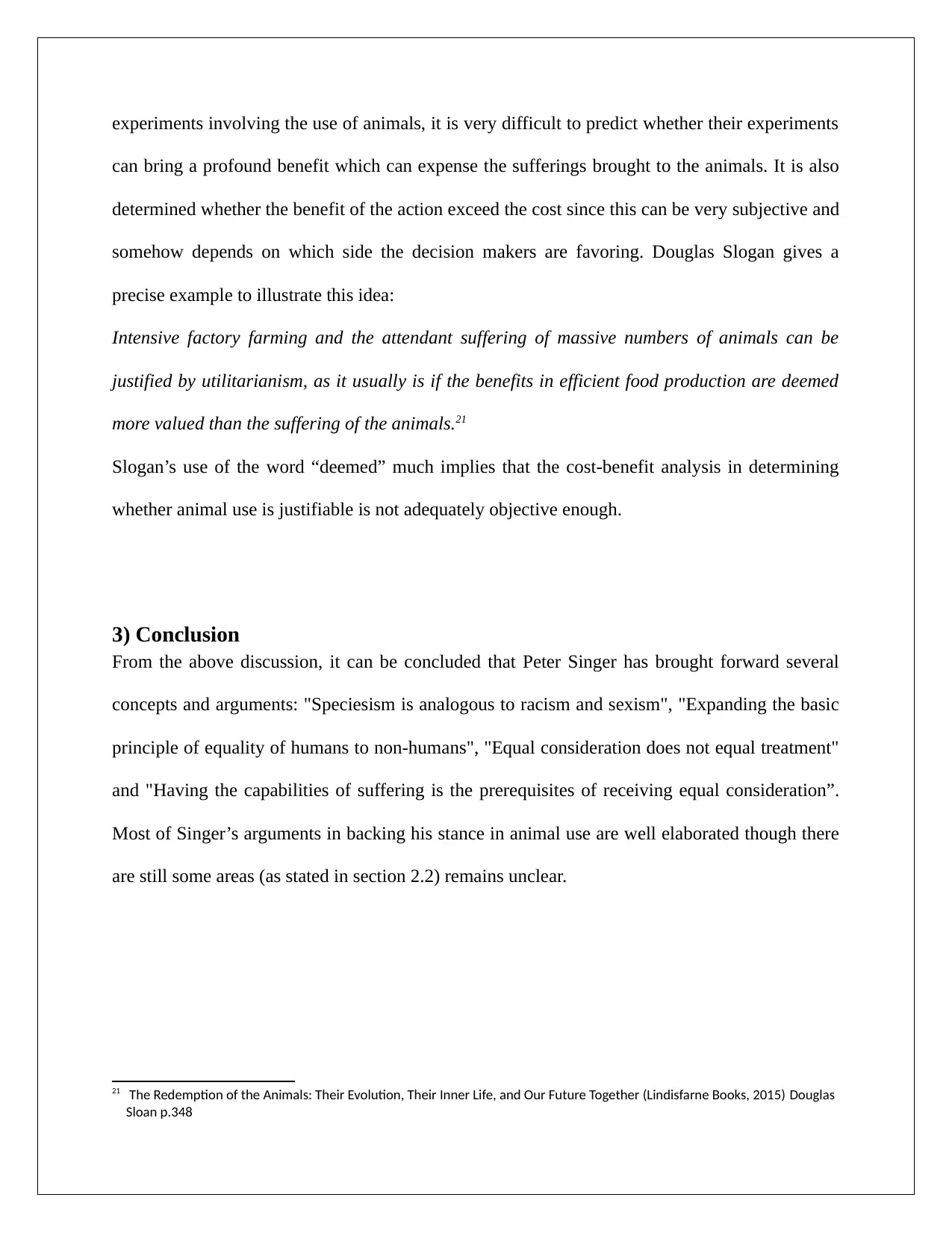
experiments involving the use of animals, it is very difficult to predict whether their experiments
can bring a profound benefit which can expense the sufferings brought to the animals. It is also
determined whether the benefit of the action exceed the cost since this can be very subjective and
somehow depends on which side the decision makers are favoring. Douglas Slogan gives a
precise example to illustrate this idea:
Intensive factory farming and the attendant suffering of massive numbers of animals can be
justified by utilitarianism, as it usually is if the benefits in efficient food production are deemed
more valued than the suffering of the animals.21
Slogan’s use of the word “deemed” much implies that the cost-benefit analysis in determining
whether animal use is justifiable is not adequately objective enough.
3) Conclusion
From the above discussion, it can be concluded that Peter Singer has brought forward several
concepts and arguments: "Speciesism is analogous to racism and sexism", "Expanding the basic
principle of equality of humans to non-humans", "Equal consideration does not equal treatment"
and "Having the capabilities of suffering is the prerequisites of receiving equal consideration”.
Most of Singer’s arguments in backing his stance in animal use are well elaborated though there
are still some areas (as stated in section 2.2) remains unclear.
21 The Redemption of the Animals: Their Evolution, Their Inner Life, and Our Future Together (Lindisfarne Books, 2015) Douglas
Sloan p.348
can bring a profound benefit which can expense the sufferings brought to the animals. It is also
determined whether the benefit of the action exceed the cost since this can be very subjective and
somehow depends on which side the decision makers are favoring. Douglas Slogan gives a
precise example to illustrate this idea:
Intensive factory farming and the attendant suffering of massive numbers of animals can be
justified by utilitarianism, as it usually is if the benefits in efficient food production are deemed
more valued than the suffering of the animals.21
Slogan’s use of the word “deemed” much implies that the cost-benefit analysis in determining
whether animal use is justifiable is not adequately objective enough.
3) Conclusion
From the above discussion, it can be concluded that Peter Singer has brought forward several
concepts and arguments: "Speciesism is analogous to racism and sexism", "Expanding the basic
principle of equality of humans to non-humans", "Equal consideration does not equal treatment"
and "Having the capabilities of suffering is the prerequisites of receiving equal consideration”.
Most of Singer’s arguments in backing his stance in animal use are well elaborated though there
are still some areas (as stated in section 2.2) remains unclear.
21 The Redemption of the Animals: Their Evolution, Their Inner Life, and Our Future Together (Lindisfarne Books, 2015) Douglas
Sloan p.348
1 out of 13
Related Documents
Your All-in-One AI-Powered Toolkit for Academic Success.
+13062052269
info@desklib.com
Available 24*7 on WhatsApp / Email
![[object Object]](/_next/static/media/star-bottom.7253800d.svg)
Unlock your academic potential
© 2024 | Zucol Services PVT LTD | All rights reserved.
